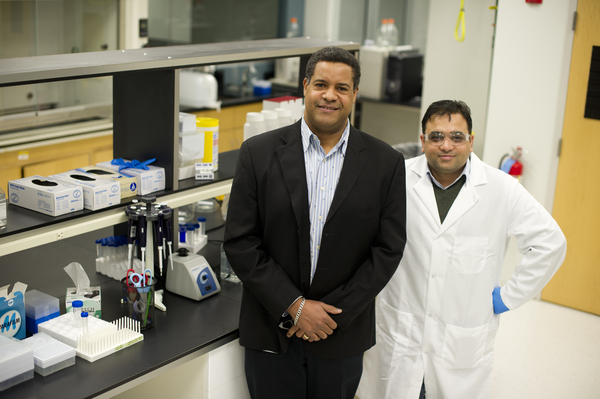Researchers as entrepreneurs

Many stars must align for a university research project to turn into a successful independent business. Just ask Northeastern alumnus Joel Berniac, the chief executive officer and co-founder of Akrivis Technologies, a life sciences company committed to commercializing research from the lab of Northeastern professor of pharmaceutical sciences Ban-An Khaw.
Akrivis has developed a medical device that can detect the presence of diseases like cancer earlier than existing methods. It uses blood tests capable of detecting biomarkers at very low concentrations and imaging techniques capable of visualizing millimeter-size tumor lesions. The company has raised nearly $750,000 since its founding in 2009 and late last year moved its headquarters from a high-tech business incubator to new lab space in the Salem, Mass., headquarters of US Biological, now a strategic and distribution partner of Akrivis.
Berniac credits the company’s early success to Northeastern’s new Labs to Ventures program, which guides top graduate students through the process of turning their research into independent companies.
“We knew there was real potential to commercialize this product, and we’re already seeing that spinning this research off into a new venture was the smart thing to do,” said Berniac, who in 2005 earned his high tech MBA, which incorporates innovation and business-planning courses.

Marc Meyer is the Robert Shillman Professor of Entrepreneurship and a Matthews Distinguished Professor. Photo by Brooks Canaday. Photo by Brooks Canaday.
The Labs to Ventures program was designed last year by Marc Meyer, a Matthews Distinguished Professor and the Robert Shillman Professor of Entrepreneurship. It is one of a family of programs within the newly launched Center for Entrepreneurship Education whose missions is to engage student and alumni entrepreneurs and cultivate a campus culture of innovation. Also included in the center is the Entrepreneurs Club and IDEA, the university’s student-run venture accelerator. Labs to Ventures fast tracks research-oriented startups into IDEA, which provides advice, mentorship, and financial support to companies like Akrivis, which received $10,000 in gap funding last year.
A major component of the program, part of the School of Technological Entrepreneurship’s efforts to provide services to students across the university, is a course called New Venture Creation. As part of the D’Amore-McKim School of Business’ MBA curriculum, it teaches business students and researchers without formal business training how to find compelling applications for technology, write a business plan, and obtain funding.
A donation from alumnus Alan McKim, who earned his master’s in business administration in 1988 and is one of the two donors for whom the university’s business school was renamed, ensures that researchers without the financial means can take the course, Meyer said.

Shashi Murthy is a professor of chemical engineering and is a co-founder and chief scientific advisor at Quad Technologies. Photo by Mary Knox Merrill.
Doctoral student Sean Kevlahan took the course and then co-founded Quad Technologies with Shashi Murthy, an associate professor of chemical engineering, and fellow PhD candidates Brian Plouffe and Adam Hatch.
Founded in 2012, Quad Technologies aims to commercialize a unique dissolvable hydrogel developed in Murthy’s lab. The gel’s properties make it a powerful tool to address a wide range of medical and scientific challenges including protein purification and rare cell separation. The company recently partnered with a German firm that developed a device to capture cancer cells from a patient’s body; in this case, the gel dissolved while the cancer cells remained intact for doctors and researchers to examine.

Bob Lentz is chairman of IDEA’s advisory board and the Center for Entrepreneurship Education’s inaugural entrepreneur-in-residence. Photo by Brooks Canaday.
As part of the Labs to Ventures program, entrepreneurs also get the opportunity to meet with potential investors, many of them Northeastern alumni. Bob Lentz, the Center for Entrepreneurship Education’s entrepreneur-in-residence and a member of IDEA’s advisory board, helps facilitate many of those meetings, introducing founders of Northeastern-based ventures to venture capitalists and angel investors.
“Our whole system is built to connect all the dots,” Meyer said. “There’s amazing innovation happening in labs all across Northeastern, and we’re creating the tools to train and launch the next generation of entrepreneurs.”





